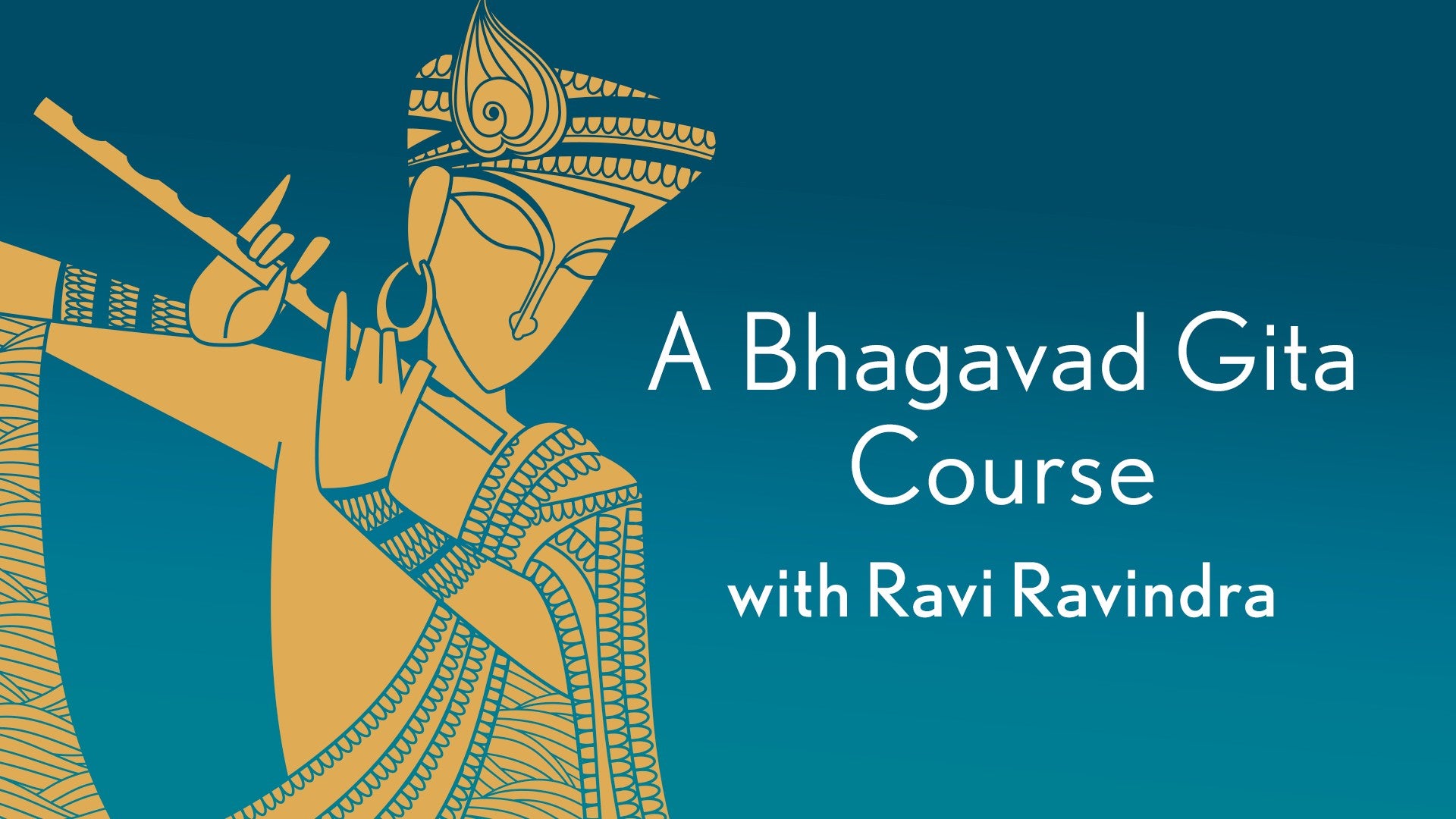Description
About This Video
Transcript
Read Full Transcript
Meditation
Please feel free whether you wish to close your eyes or keep them open. If they are open, it is better not to focus on anything far away. Just lower them down a little. But if they are closed, for some people there is a sense of uneasiness. So feel free to open them whenever you wish.Just a quick reminder from last time, we are in this very large universe, permeated by cosmic intelligence or very subtle forces and energies. And we cannot command these forces because they are said to be, by all the sages, to be subtler and more conscious than we are. But we can become more and more receptive to them. And highly recommended two contributions from our side. Deeper and deeper relaxation.
All relaxation is even more important than physical relaxation. And to search for an alignment in which I have a verticality without rigidity. And if my eyes are open, I should be able to look horizontally. At the same time, the intellectual posture of not assuming that I can make comment on everything I hear, even in principle, I do not and cannot know all there is to know. So with that general background, we bring our attention to our breath.
Contemporary usage of the English word breath no longer carries this sort of richness that is still carried by the Chinese word qi or the Sanskrit word prana. So even if I now use the English word breath, but think of this slightly more richly, that breath is the connecting link between all levels of reality. It does not mean only the ordinary air that I breathe or what I breathe out. A quick reminder from last time, according to the Bible, is the breath of God in each one of us which is keeping us alive. Very similar suggestions from the Upanishads and every ancient teaching.
So take a few moments to become aware of your breath. And that is very much assisted by becoming aware of the movement of your abdomen, up and down, corresponding to breathing in and breathing out. But without forcing anything, don't hold your breath outside or inside, simple awareness of the fact that breathing is taking place. Thank you. We know only from external knowledge that each part in our body needs to be refreshed or nourished continuously by elements we breathe in, but to actually try to be aware of this more and more deeply internally requires enhanced sensitivity to our own organism.
So you bring your attention now to your right leg, you're breathing in, breathing out, remaining in contact with breathing, if you bring some attention to your right leg without forcing anything, relying on your own experience, do you feel or sense a slight shift in the vibration in the right leg or quality of energy or quality of life, not to get attached to any of these words they are trying to hint at something, so you wish to be aware of the breath in your right leg right from the thigh to the toes. Now intentionally we shift our attention to be aware of the breath in the left leg, the whole of the leg from the thigh to the toes, can I now actually sense that this is not a wooden limb, it's alive, relying on your own experience. Now we shift our attention to the whole of the pelvic area. Abdomen. In a way it's easier here because of the movement of the abdomen but to stay behind the movement, what in Japanese gets called Hara, the center of gravity of the whole body.
Now we shift our attention to the chest, you're not advised to hold your breath in or out, you're simply ordinarily breathing in and breathing out. Right arm, all the way from the shoulder to the fingertips. Left arm, all the way from the left arm to the left arm. Right arm, all the way from the left arm to the left arm. Now we shift our attention to the back, the whole of the back from the neck down to the base of the spine.
Now we shift to the head, everything above the neck, including the jaws, the eyes and what we ordinarily call head. And watch whether bringing attention to your breathing in and out there creates a sense of space or maybe it creates obscurity for you. Simply accept what I say, rely on your own experience. Now each one of us at our own tempo take five breaths as it were placing your out breath into the whole of your body from the top of the head to the toes and watching what difference does it make. Thank you, we're finished now.
Just to mention one or two remarks from last time, as we said that dharma essentially deals
Talk
with what is the right action. And it is an important word to understand anything in the Indian culture, but in any case in the Bhagavad Gita. And then Krishna's response overall may be summarized, it is not so expressed in the Bhagavad Gita, but overall that no action can be right until the actor is right. And in order to be the right actor, a very radical transformation needs to take place. And therefore Krishna advises Arjuna to undertake the whole discipline of yoga.Because yoga is the science for excellence of transformation. And then also very much the suggestion that strictly speaking the discipline of yoga cannot really be accomplished without the Sanskrit word is yajja, which certainly means sacrifice. So sacrificing my attachment to what I usually am, otherwise I would not be willing to be transformed. I may agree it's a good idea, as long as I don't have to change. I actually am reminded of a very lovely remark of Saint Augustine in his book called The Confessions where he reports his own prayer.
He said he used to pray, God give me poverty, give me chastity, but not yet. He is a great saint who actually describes what goes on in our minds. We fantasize many things in any case. So yajja certainly requires sacrifice, but it also requires, as I tried to say yesterday, based on the clear understanding in all the teachings that there are many levels of reality and that unless something from a higher level or a deeper level within myself, these levels are not only outside, they are also inside. Until that is involved, nothing is really going to be accomplished.
Anybody can easily see. We have all kinds of New Year's resolutions, sounds very nice, but unless a deeper self in me is really convinced of this, I can't carry it out. So one need not think of the word deva or angels just completely external. Different levels within ourselves are also there. We are very deeply moved by something and a different kind of insight comes, a different kind of clarity comes.
So that was the general background and then naturally Krishna begins to teach yoga. So this book, which is supposed to be a dialogue about dharma, becomes a classic of yoga. And then here I want to first of all emphasize something, which to my surprise hardly seems to be mentioned by most yoga teachers, that the main yoga that Krishna teaches in the Bhagavad Gita is buddhi yoga. For simplicity, I can translate this as the yoga of awareness, but a few more remarks need to be made about this word, buddhi. First of all, as a very simple way of describing the human structure, it is said in the Bhagavad Gita very much implied that we have the senses or the body, and then we have the ordinary mind, which is called manas in Sanskrit, which Krishna at least twice explicitly includes among the senses that that ordinary mind is almost completely driven by the bodily needs and desires.
But nevertheless, it has an analytical tendency and one of its strongest characteristic is to look for differences rather than for what is common. It is analytical rather than synthetic, if one can make that kind of a distinction. But then the suggestion is very much that we have a subtler level of the mind, we could still use the word mind, but that has a different quality, and that in Sanskrit is called buddhi. So there is the body, if you like I can give you the Sanskrit word for it, there are two different words, both translated as the body, sharir as well as deha. So it doesn't matter, we simply use the word body, but the other two is good to keep the Sanskrit words because it is difficult to give one word translation into English.
So manas and buddhi, if you like we could call them at two levels of the mind, extreme version will be the monkey mind and the buddha mind, both are mind. So but stay with those two words, they have different qualities as I just mentioned one already, but I want to take a few more, first of all let me mention after all there are literally I don't know hundreds but certainly dozens of translation of the Bhagavad Gita in English, some of you may know many of them already, and you will find a different translation of this word by different people, for example quite commonly it will be translated as the intellect, but then they end up putting a capital I just to make a little difference from the ordinary intellect or reason with a capital R or intelligence or awareness which ultimately I suggest is closer to its usage. But then there are several other translations and the reason for that will become a little clearer in a moment, a very well-known western scholar R.C. Zayner actually translates buddhi as soul which initially surprised me, the reason I am mentioning this here because he says it is serving the same function in the Bhagavad Gita as soul does in the Bible. So here gives you some idea of the richness of this word and that no single translation or no word will quite do the job.
Now having said that let me just first of all mention to you the root of this word is exactly the same as the word buddha they both come from the same root which means to awaken and the word buddha to call somebody buddha means one who is awake and the implication is that in general we behave as if we are asleep. Now here I want to make a little bit of a footnote almost. In fact this kind of remark is made by all the great teachers. Obviously the language is a little different for example in the Christian context teachers would somehow convey that in general we live in sin but we could live in the grace of God. A more Vedantic oriented person would convey in general we live in illusion but we could live in reality or with so or for example Guruji would say in general we live mechanically but we could live more consciously.
So here in the context of the Bhagavad Gita very much the suggestion is that we in general live from the lower mind or manas but it is possible to live from the level of the buddhi which would be like the higher mind. There are different teachers would use slightly different expressions so we cannot always equate them personally my impression is I can't be certain of that that when Krishnamurti speaks about intelligence beyond thought that that is what he is referring to buddhi. For simplicity I end up using only one word to translate buddhi awareness but don't get so attached to it occasionally I myself also say integrated intelligence is another way of referring to this. It is one more general remark actually to be made not only about the Bhagavad Gita but about the whole of the Indian spiritual or philosophical discourse slightly to my surprise but it happens to be the case there is almost never a separation made between the heart and the mind manas includes both the lower kind of emotions anxiety worry anger etc. As well as lower kind of thinking analytical thinking and buddhi includes both the higher feelings such as compassion gratitude wonder as well as the if you like subtler thought or intelligence beyond thought including Krishnamurti's expression.
The word buddhi is very rich in its meaning and therefore although occasionally we end up using some translation of it but I highly recommend to keep coming back to the word itself so it gradually becomes something that you can use by itself. Now here I first of all also want to take another little bit of a background Bhagavad Gita is often said in India to be representing the essence of all the Upanishads and in fact a very classical analogy in India is that Krishna is like the cow boy milking the cow and Arjuna is acting as the little calf and he's milking the Upanishads and the Bhagavad Gita is the milk that comes from the Upanishads that's the essence of the Upanishads. Having said that here I want to take one example from Katha Upanishad by the way especially for yoga related people the first time the word yoga as a way of inner transformation is actually used in the Indian tradition is actually in the Katha Upanishad from there it begins way back. There the analogy which is used that the our whole being Atma which will be the self with the capital S which is identically the same as Brahma as I mentioned yesterday is the master of the person and Buddha is the charioteer and the body is the chariot and manas are the reins and the senses are the horses. The reason I mention this now here because when Krishna now becomes the charioteer of Arjuna remember everything can be completely externally understood but I'm reminding you repeatedly that it is meant to be an internal business it's the whole internal enterprise so now Krishna has now become occupied the place of the buddhi which is to say integrated intelligence and awareness bringing to Arjuna.
So that metaphor by the way we have almost an exact parallel of that metaphor in Plato in Plato's dialogue and also in the grigif teaching in modern times so it's really quite ironic that this metaphor seems to in one way or the other applies to a lot of people but it's in the Katha Upanishad. So the question that I further want to emphasize many many years ago partly actually in some conversation with a person who is a great authority and Plotinus all the standard English translations of Plotinus are attributed to him Hilary Armstrong professor of classics in England. He and I ended up having a little bit of a conversation and I was basically saying to him there is a whole underground movement that Pythagoras, Plato, Plotinus were very much influenced by Indian thought and he was a little annoyed with my I was just asking him a question I wasn't really asserting this and he had published a paper in the year I was born that is 1938 he to his satisfaction that this had nothing to do with India that Plotinus so but since he was a little bit annoyed by my question he said well okay let's take ordinary kind of general ideas can be found at many places that is true but let's take a very technical issue in Plotinus and something from the Indian tradition and then we'll see whether there is any connection between the two. So that's when I took the word buddhi and he took the word suke in Greek which becomes psyche in English so we actually have a whole paper on this which it was published in the by Cambridge University Press in 1979 so not yesterday already there I try to make this point that I am surprised why yoga people don't seem to seem to make any mention of this that the main yoga that Krishna teaches is buddhi yoga now first of all before I proceed let me just actually show you that this is the case so whole Bhagavad Gita has 18 chapters first chapter is essentially describing the battlefield as I mentioned yesterday also so the teaching of Krishna actually begins the second chapter and the 18th chapter is obviously the last one so the middle chapter is the 10th chapter so here I'm going to read to you three quotations from the Bhagavad Gita from the second chapter from the 10th chapter and from the 18th chapter so the first one is what has been described to you Oh Arjuna this is the second chapter 39 shloka what has been described to you Oh Arjuna is the theoretical wisdom now listen to buddhi yoga when you are disciplined with it you will be free from the bondage of action the Sanskrit word for bondage of action is karam bandhana I will come back to this if not today tomorrow because this is also slightly something peculiar in the Indian psychology or Indian philosophy although one can find echoes of this elsewhere so that we are bound by any action that we undertake is a very strong idea in India therefore strictly speaking you should not do any action that would be the ordinary implication of that so I'll come back to that later on so let me continue with just quoting to you these three remarks now this is from the 10th chapter 10th shloka to those who are constantly disciplined and who adore me with love I give buddhi yoga by which they come to me what do you say to this now 18th chapter almost towards the end that is the 57th shloka the last one actually that Krishna in fact says something substantially 65th shloka so this is 57 not very far from the end devote yourself fully to me as the supreme renounce all your actions consciously to me take refuge in buddhi yoga be always one with me in heart and mind so I naturally express some surprise there it seems to me rather plainly obvious that Krishna's the main yoga his teaching is buddhi yoga so that paper was published in 1979 created some academic stir and then much to my surprise I discover in 2006 a book written by a very great sage in India Shri Andhiravan and the title of the book in English is buddhi yoga in the Bhagavad Gita so clearly the usually yoga teachers don't seem to remark on it or notice it but obviously any of the sages would notice this he had actually published this book in Bengali apparently in the 1980s but I was not aware of this it was translated into English only in 2006 that's when I became aware of this so therefore it is not that nobody remarks on it obviously actually in a way there is nothing new in the world somebody has always noticed it already however as I just said that in fact academically it created quite a bit of a stir many people remarked on it etc etc for several years it went on and on academics like to just carry on on because if we conclude something we'll lose our jobs you know it's like the medical people have to make sure that some people remain sick otherwise what will they do so so coming back to buddhi first of all within human beings it would be regarded as the if you like subtlest level but it is still personal meaning my buddhi is different from your buddhi but it has actually this is more or less the remark of this great sage that I mentioned sri andravan he actually made this remark that buddhi has both a psychological aspect as well as a cosmological aspect my own way of expressing this or really my own way of understanding this is something as follows that if you're driving along a highway sometimes you see a sign actually if you go to ohai on highway 150 you do see a sign saying a nice lookout so if you go to that place where you see this nice lookout you can now see the nice lookout on the other side but you're still on this side so buddhi is that nice lookout although it is on this side but it can be aware of what is on the other side so when sri andravan says cosmological aspect is what is on the other side which is transpersonal that's not mine but also what is on this side that is he says the psychological aspect that is his language but the way i'm understanding it that there is something quite personal about buddhi so i can develop this try to work with it or on it buddhi is both an integration of the various aspects in myself as well as then integrating with something above myself so internal integration becoming aware of my for example if i'm fragmented internally to become aware of that is part of buddhi yuga very much emphasis in every serious teaching on self-awareness self-knowledge self-understanding and then becoming aware of that it is possible to integrate with or to relate with or at least to become aware of something above myself or above in india actually usually one would say deeper in myself if you look at any of the indian religiously oriented diagrams they're always either concentric circles or concentric rectangles or triangles because always the emphasis is that ultimately i need to go deep within not outside to be searching for the ultimate reality so but in the usually in the abrahamic tradition the tendency is to say higher levels in india general tendencies to refer to inner levels or deeper levels so i often end up using the word subtler levels to cover both sides because language is needed but every expression has a limitation it draws our attention in a certain way but it leaves out other things so if there is one remark i very often make and i recommend to all my friends remember expression of truth is not the truth at best a good expression coming from a real sage can point to the truth towards it but it is not the truth so don't get attached to any expressions but let me return nevertheless to what we were speaking about here that buddhi yoga is a call for integration within oneself as well as relating with or integrating with something subtler than myself now here since i mentioned sri and ravan very great sage i was very fortunate to actually meet him for about half an hour he was more or less on his death bed but he agreed to see me in any case and so he had to sort of more or less lie in bed half raised but i won't go into all the details here but the one remark which is quintessentially indian and yesterday i started if you remember or day before yesterday giving some overall idea that brahma is in everything and is everything as i was leaving this is what he said when you realize that god is the same as dog you will know something real this is quintessentially indian but i had never heard this earlier he was the first person from whom i heard this as i was leaving after a half an hour conversation this is what he said and i'm simply now repeating it when you know god is the same as dog you will know something real however coming back to the question of buddhi so to become aware of what i need is the major or what i lack is the major call of buddhi yoga and here to make a overall remark as i in fact mentioned this slightly casually yesterday awareness is the mechanism of transformation in fact if you know any other mechanism i will be happy to learn so it is not only the mechanism it is the only in my understanding the only mechanism of transformation even when let us say a person has been assaulted at the age of five six seven a little kid something stays in our psyche in our body even for dozens of years or decades eventually supposing one ends up seeing a psychiatrist they may assist the person to somehow become aware of what took place then some transformation can take place so keep this in mind it's very important to understand they sound like a very simple expression awareness is the mechanism of transformation then it gets expressed in two or three different ways this is actually coming from plotinus i'm more or less quoting him knowing and being are the same because the kind of knowing he's talking about is not just some external knowledge unless the knowledge transforms me it's not real knowledge krishna is very explicit about this in the bhagavad gita actually in the 13th chapter i may later on have a chance to speak about this a bit but but much more importantly otherwise you know i often say to people whether they there are two trillion galaxies or three trillion or one billion or one million what difference does it make to your life that's not the kind of knowledge krishna is interested in not that he's against it it's all very nice it keeps the mind occupied but the sort of knowledge that transforms what the person is so knowing and being are the expressions used by plotinus are spiral to the mind spiral in nature so buddhi yoga i'm simply saying now increasingly the obvious thing that the reason why krishna emphasizes it so much that all the other yogas which are given explicit names and for example i may even have this on the slide here yes often we have these four or five yogas get mentioned karma yoga which is yoga of action jyani yoga yoga of sacred knowledge jyani yoga which is yoga of meditation bhakti yoga which is yoga of love and worship these are the standard forms of yoga i will probably speak about each one of them in one day each day perhaps but here i just want to emphasize that these are all different aspects of buddhi yoga they are not in contradiction with each other if i am actually aware sometimes i need to undertake an action sometimes i need to sit down and not undertake any action sometimes i need to study something to try to understand what the scriptures have said sometimes i need to meditate sometimes i need to bring a whole attitude of love or worship if it is something subtler than myself or higher than myself so none of this is forbidden buddhi yoga is really i sometimes use this analogy it's like in an orchestra the conductor sometimes invites flutes sometimes strings sometimes drums they're not against each other but they don't necessarily always play together certain or sometimes they do play together so buddhi yoga is the overall conductor and various other yogas are invited as and when necessary here i should make one other remark since dhyana yoga is almost always translated as yoga of meditation the word dhyana used by patanjali is a little differently used there i say that i say that largely because most of my audience is likely to be yoga interested dhyana there is only one aspect of quality of attention dharana dhyana samadhi and so but staying with the general usage of the word dhyana is meditation that's the way krishna uses in the bhagavad gita so it's not the exact equivalent usage in patanjali's yoga sutras that's one thing but when buddhism went to china which was more or less in the beginning of two millenniums ago the word was not translated but it was pronounced in a chinese way chan dhyan became chan and then buddhism went to korea from china where it became sun from korea it went to japan where it was pronounced as zen zen is the japanese pronunciation of the korean pronunciation of the chinese pronunciation of the sanskrit word dhyan hmm interesting how the words get so with zen meditation is the main thing that is attached with zen that's zen the whole tradition of zen the very word zen actually comes from sanskrit dhyan none of these various yogas are meant to be in contradiction with each other and the suggestion really is this is very typical thing in the whole of the indian psyche that there is no one way to krishna or to brahma or to the real self that everybody has to find their own unique path that is another use of the word yoga so they have to find their own unique yoga by yoga there simply means the path which could be a combination of all of those standard yogas that i just mentioned and it depends on the nature of the person not everybody is meditation inclined not everybody's studies inclined not everybody's worship inclined whatever one's tendencies are inclination are this is why for most especially educated indians whenever they see especially in every major cathedral would have a sign there is only one way which is often referring to christ to them it seems very strange because even everybody's understanding of christ is different actually william blake made this very interesting remark your christ has a nose like thine my christ has a nose like mine especially if you actually have ever seen the images of the buddha in japan they're very cute especially as a young buddha a nice japanese boy everybody knows that he was born in india but still naturally in japan it makes more sense to indicate a japanese kid so it is inevitable that we adapt these images to suit our own tendencies it constantly surprises people especially this happened more so in germany in the nazi era that christ was you know with blue eyes viking looking character could hardly be the case for a palestinian born 2000 years ago so therefore the idea that everybody has to find one's unique journey in general the imagery that is used which may be helpful for me to mention here that we the whole human beings are like a big sphere we are on the surface of the sphere and as we go more and more inside what we need to do is to go absolutely to our center that is where brahma is my center is as it were everybody's center so if on a circle you imagine one person here one person here if both of them go a little deeper inside they come a little closer to each other therefore from the hindu point of view it makes no sense whatever is called conversion because conversion simply means you go from this point on the surface to another point on the surface but you remain on the surface so you now put a different label but you remain on the surface if you have ever had a chance to speak any of the more or less relative speaking sages from related with hinduism if you ask them i want to become a hindu first of all well if you're really eager they'll find some way of making you a hindu but there is actually no process for this they would simply say well if you're christian be a good christian then you'll be a good hindu gandhi even used to actually translate for him hindu means one who is searching for truth there you are so one could search for truth wherever but i say that because from the hindu point of view it there is not one way krishna repeatedly says in the bhagavad gita whatever devas or whatever gods or angels one worships if you do this with full mind and heart you come to me any path will do but you have to find your own unique path so yoga has that meaning also there are many different ways it gets translated another one yoga is often translated as discipline especially barbara miller's translation of the bhagavad gita she always uses the word discipline to translate yoga which is fine i mean it's very difficult to find one word translation of this but yoga root of this word is union according to which then the individual spirit can be united with the cosmic spirit that's the union or integration that's the root of it actually from that point of view in another of my articles you find in my book spiritual roots of yoga where i mentioned some of these articles i try to say if one were to translate religion from english into sanskrit often people end up using the word dharma as translation this is not at all the right translation yoga will be the closest to it because the english word religion comes from the latin root really meaning to reconnect to reunite that is much closer to yoga than dharma so but no word in word translation is really sufficient one has to always be a little aware of this but in any case having just said that yoga is often translated as discipline but it is very important here for me to mention that discipline is not intended to convey torture sometimes people use that word to mean something a little differently so here i have a couple of remarks from the bhagavad gita that i'll read first of all this is from the sixth chapter this yoga is not for one who eats too much or sleeps too much oh arjuna nor for one who gives up sleep or food yoga destroys the sorrow of the one who sleep and waking food and play and actions are all disciplined now you see the implication of the word discipline there is to find the right order right balance not eating too much or too little or sleeping too much or too little because there is often a tendency as if in every religion you'll find extreme versions of everything really as if you have to have sleep on a bed of nails you have to fast for 37 days or something like that you'll find extreme examples of that kind in india also of course but i don't think that's what krishna especially recommending or approving and here is another remark of his this is in the 17th chapter and those who undertake violent austerities torture the aggregates of the elements in the body and also torture me who is seated within their body this is krishna saying he's seated in our heart in our body in our mind everywhere as i quoted yesterday okay everything that exists is a combination of the field and the knower of the field this is in the 13th chapter and i am the knower of the field in all fields that's what krishna says so everything that exists has krishna in it and this remark is the Sanskrit word is by the way in case you have interest in Sanskrit literally means seated in the body which is so krishna says don't undertake violent austerities that's not recommended because then you torture not only the aggregates of the body but you torture me who's seated in the body such a strong expression and certainly him saying literally dozens of times in the Bhagavad Gita that i'm seated in the heart of everyone in the mind of everyone that is really repeated so frequently that one sometimes wonders how often does he have to say this but i guess we are pretty dense we don't easily accept this so i have a suggestion for really if you like an exercise if you wish in within yourself
Homework
to try to understand the distinction between manas and buddhi i recommend in english if you begin by understanding the difference between thinking and awareness when i say i'm thinking about something or when i say i am aware of something what is the difference internally much more to be becoming more and more sensitive to one's mind and one's body and then one would have a slight feeling for the difference between manas and buddhi the functioning of manas and buddhi i don't want to dwell on this right now but but paying attention or thinking is coming something from me becoming aware of something also means i become receptive to something do you notice the difference of course in english language naturally every language has its own modality it's and everything is very much influenced by its philosophical and religious traditions so is english language people may be surprised by this we have great authors have written whole books on it how fundamental ideas of the english language are actually influenced by the whole biblical tradition but similarly of course sanskrit or hindi is influenced by the spiritual traditions in india so it becomes a little difficult to have an exact translation of things which is why you will see dozens of translations of the bhagavad gita each translation has its actually i often say translation is a transcreation it can hardly be otherwise so we'll stop thank youBhagavad Gita
Comments
You need to be a subscriber to post a comment.
Please Log In or Create an Account to start your free trial.


















